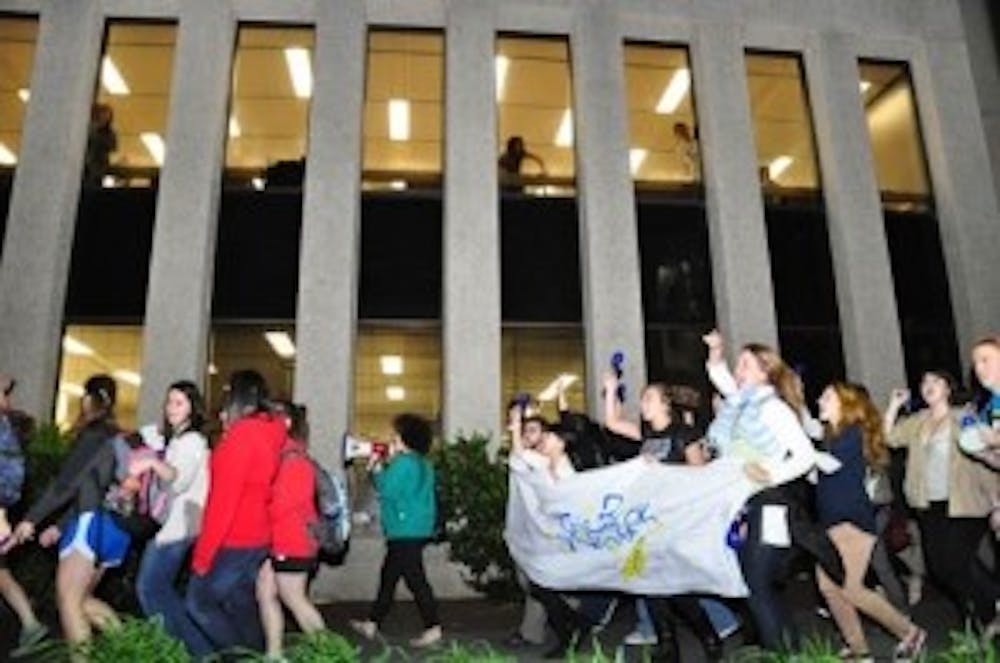Incoming students learned about sexual assault prevention at New Student Orientation sessions this year, continuing AU’s recent expansion of sexual assault prevention programming on campus.
The Office of Campus Life has been working to implement sexual assault education into the new student experience for many years.
“When we implemented Alcohol.Edu several years ago, it was important to us that sexual assault prevention was part of the online education program that every first year student is asked to complete,” Vice President of Campus Life Gail Hanson said in an email.
The addition of sexual assault education into orientation is a way to increase discussion of the issue even more, Hanson said.
Hanson explained that the decision to add sexual assault prevention training to orientation did not undermine the decision the OCL made two years ago to turn down funding from the Violence Against Women.
“Implementing mandatory training enforced by penalties (which the VAWA grant required) - such as stops on registration - is an institutional decision,” Hanson said. “We did not think this was a necessary or appropriate approach since more than 95 percent of new students voluntarily participate in orientation, and we could accomplish the intended objective without penalties.”
Recommendations from the Sexual Assault Working Group and the Student Government Women’s Initiative contributed to elevating the issue of sexual assault this year. The Working Group focuses on policy, education, and advocacy related to sexual assault by researching best practices for dealing with sexual misconduct and making recommendations for improvement, The Eagle previously reported.
The appointment of a full-time sexual assault prevention coordinator to oversee the sessions and new guidelines on Title IX enforcement contributed to the change as well, Hanson said.
Title IX states that no student can be discriminated against on the basis of sex, which includes sexual harassment, according to the U.S. Department of Education. The new guidelines require college campuses to be more accountable for sexual assault prevention than in the past, Hanson said.
At orientation Students learned about sexual assault prevention in a session titled, “Critical Issues Forum.”
AU Sexual Assault Prevention Coordinator Daniel Rappaport, Orientation Leader Laura Bruns and Seth Yates, a junior in the School of Communication and sexual assault peer educator, lead the June 19 session.
The session began with some basic facts about sexual assault.
“Eighty percent of sexual assault cases are committed by someone the victim knows,” Yates said. “That number jumps to over 90 percent on college campuses.”
“One in 10 men will be involved in sexual assault in their lifetime,” Bruns said. “1 in 4 women face sexual assault in college.”
Rappaport continued the session, explaining that discussion and education have proven to be the most effective way to prevent sexual assault.
Yates continued, demystifying common misconceptions about sexual assault. Yates said one myth was that sexual assault is a crime of passion and lust.
“Men are fully capable of controlling their urges,” Yates said.
Throughout the session, Rappaport asked true or false questions and asked students to send in their answers using clickers that were passed out at the beginning of the session. The results were projected onto a screen for everyone to see.
Those with clickers appeared to be participating as the results of each question showed that all 100 students with clickers had answered.
For one of the questions, Rappaport asked whether women often lie about rape or falsely accuse someone of rape. Thirty percent of the students answered true and 70 percent answered false.
The correct answer was false, Rappaport said, citing FBI reports that state false accusations of rape only happen about 2 percent of the time.
“It’s absolutely worth it to believe [victims],” he said.
At the end of the session, students were encouraged to get involved with sexual assault education in the fall by participating in the Green Dot bystander intervention program.
“The Green Dot program allows students to train to intervene and diffuse potential sexual assault situations,” Rappaport said.
Beyond orientation Sexual assault education at orientation isn’t limited to new students. Parents attending orientation have a session titled “Late Night Calls: Helping You Help Your Student.”
During the session, parents are encouraged to discuss issues of sexual assault before their students come to campus in the fall.
"Parents learned about the national data on sexual assault during the college years, the experience here at AU and our protocols for educating students and responding to reports,” Hanson said.
While there has been an extra push to integrate sexual assault education into orientation this year, it won’t be the last time students hear about sexual assault during their time at AU.
“The basic information delivered in these sessions will be elaborated upon in the fall and throughout the year,” Hanson said.
Michael Metzger, the assistant director of new student programs, said the response from students seems to be positive.
“Orientation leaders,” Metzger said in an email, “have shared with me that students are saying that they appreciate AU taking the time to talk about these topics and that the presentation really makes them think.”
rzisser@theeagleonline.com





